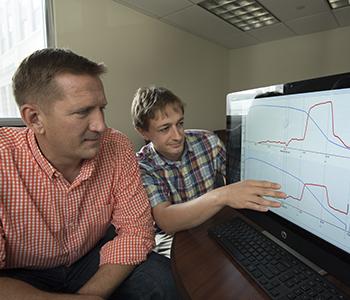Washington University BioResearch Product Faire™
Posted by BCI Staff on Mon, Feb 15, 2021
Tags: Washington University in St. Louis, BioResearch Product Faire™, Virtual, 2021
Posted by Emily Olson on Wed, Nov 02, 2016
The $10 million gift from Andrew M. and Jane M. Bursky will advance cutting-edge research at the newly named Andrew M. and Jane M. Bursky Center for Human Immunology and Immunotherapy Programs. Research at the center focuses on harnessing the immune system to fight cancer, infectious diseases, and autoimmune disorders.
Read More
Tags: Washington University, Missouri, Washington University in St. Louis, new research funding, cancer research, infectious diseases, Immune System, MO, Midwest Region, immune system research, Washington Univsersity St. Louis, cancer therapy
There are many solutions to the challenge of producing food for an ever-growing human population. One approach is to simply produce more food; we have seen successes on this front from research teams at the University of Wisconsin, Madison and the University of Illinois, Urbana-Champaign. Another approach, proposed by biologists at Washington University, St. Louis, attempts to increase quality over quantity, increasing nutrient content in existing crops.
Read MoreTags: Washington University in St. Louis, 2015, BioResearch Product Faire Event, MO, St Louis, UWash
A rational approach to tackling diabetes using life science research is to focus on insulin. We’ve seen a research team at Emory University transplant insulin-producing cells, and we’ve reported on an Urbana-Champaign team trying to release insulin in patients’ cells. Now researchers at Washington University at St. Louis are taking a new approach by directly reducing blood sugar without the use of insulin.
 Brian Finck (image left, courtesy WUSTL) believes that rather than rely on insulin to lower blood sugar in patients with diabetes, it’s easier to cut out the middle man and reduce glucose levels using genetics. He and fellow WUSTL professor Kyle McCommis found that shutting down a particular liver protein dramatically reduced glucose production in the liver.
Brian Finck (image left, courtesy WUSTL) believes that rather than rely on insulin to lower blood sugar in patients with diabetes, it’s easier to cut out the middle man and reduce glucose levels using genetics. He and fellow WUSTL professor Kyle McCommis found that shutting down a particular liver protein dramatically reduced glucose production in the liver.
“We think this strategy could lead to more effective drugs for type 2 diabetes,” says Finck, who is an associate professor of medicine in the Division of Geriatrics and Nutritional Science. “A drug that shuts down glucose production has the potential to help millions of people affected by the most common form of diabetes.”

(Brian N. Finck, PhD (left), and Kyle S. McCommis, PhD analyze blood sugar levels to evaluate their new strategy. Image courtesy WUSTL)
The team has already initiated clinical trials using the drug compound MSDC-0602. So far, the drugs have been successful in inhibiting the protein and reducing blood sugar levels. Dr. Finck is working with the biopharmaceutical company Metabolic Solutions Development Co. to facilitate production of the drug.
Funding for this research came from the National Institute of Diabetes and Digestive and Kidney Diseases and the National Institute on Alcohol Abuse and Alcoholism of the National Institutes of Health as well as the Foundation for Barnes-Jewish Hospital and the Robert A.Welch Foundation. For additional information about funding for research at Washington University in St. Louis, read our free WUSTL Funding Statistics Report, available via the link below:
Read MoreTags: WashU, Washington University in St. Louis, 2015, BioResearch Product Faire Event, MO, St Louis
One of the most pressing pursuits in bioscience is increasing agricultural production. The Food and Agriculture Organization estimates that, as a planet, we need to produce 70 percent more food by the year 2050 in order to keep up with increasing population. We have already shone our spotlight on several university research teams who are tackling this problem, like the UW team attempting to increase flowering rates and the UIUC team who spliced algae genes to increase photosynthesis. Now we look to Washington University in St. Louis for some novel ideas about optimizing photosynthesis.
Read MoreTags: WashU, Washington University in St. Louis, 2015, BioResearch Product Faire Event, MO, St Louis
If kidney cancer is diagnosed before it spreads, then doctors have a much better chance of curing it. In fact, 80 percent of kidney cancer patients who get their cancer diagnosed early survive. Unfortunately, most patients don’t find out about their affliction until too late. At Washington University, St. Louis, a group of researchers is working on a more proactive approach to detecting the disease.
Read MoreTags: WashU, Washington University in St. Louis, 2015, BioResearch Product Faire Event, MO, St Louis
Posted by Jennifer Nieuwkerk on Fri, Jan 31, 2014
Washington University School of Medicine is constructing a new $75 million, 138,000 square-foot research building with a June 2015 target date for completion. The energy-efficient new research building at Washington University will feature state-of-the-art, highly flexible laboratory space where researchers will focus on the most prominent problems in human biology.
Tags: 2014, Washington University, Missouri, Washington University in St. Louis, St. Louis Bioresearch Product Faire Event, Research Funding, MO, St Louis, new Building
Tags: 2014, Washington University, Missouri, WashU, Washington University in St. Louis, St. Louis Bioresearch Product Faire Event, MO, St Louis, researcher invite, researchers invited, lab product expo
Posted by Jennifer Nieuwkerk on Fri, Oct 04, 2013
Researchers at Washington University in St. Louis recently received a great deal of life science research funding for leukemia research. The National Cancer Institute, part of the National Institutes of Health (NIH), gave the university two grants totaling $26 million. The money will be given to leukemia researchers and physicians at Siteman Cancer Center at the Washington University School of Medicine, according to St. Louis American Local News.
Tags: 2014, Midwest, 2013, Washington University, Missouri, WashU, Washington University in St. Louis, St. Louis Bioresearch Product Faire Event, BioResearch Product Faire Event, MO, St Louis, NIH funding, NIH grant, NIH award